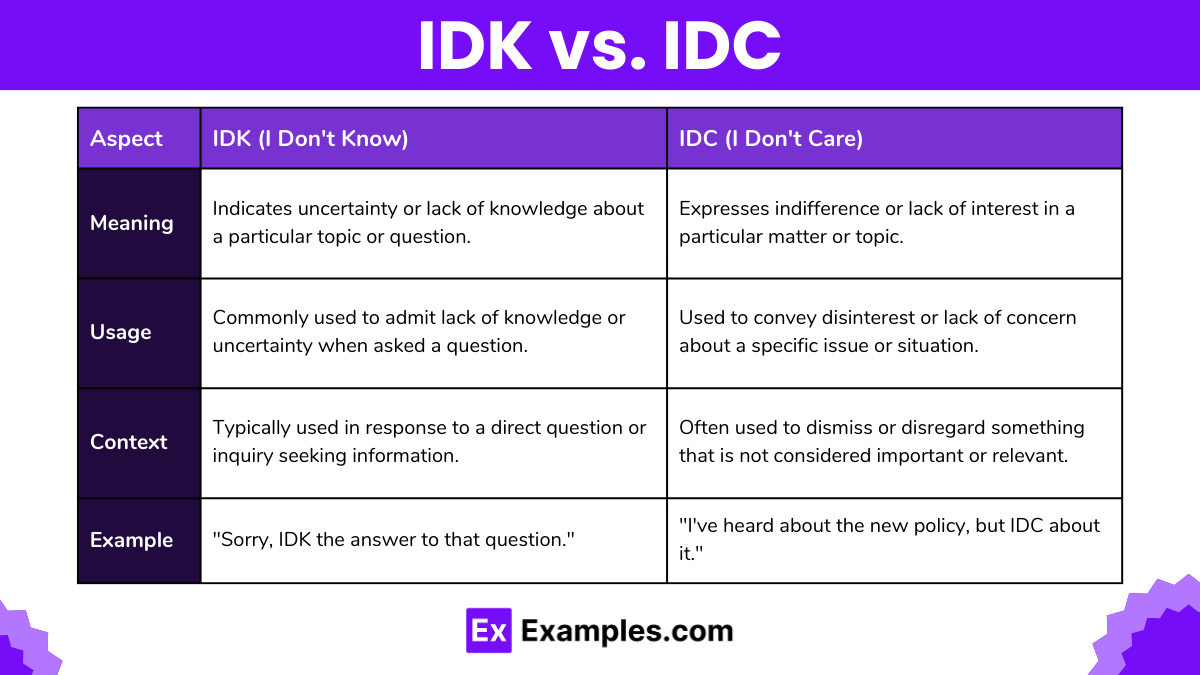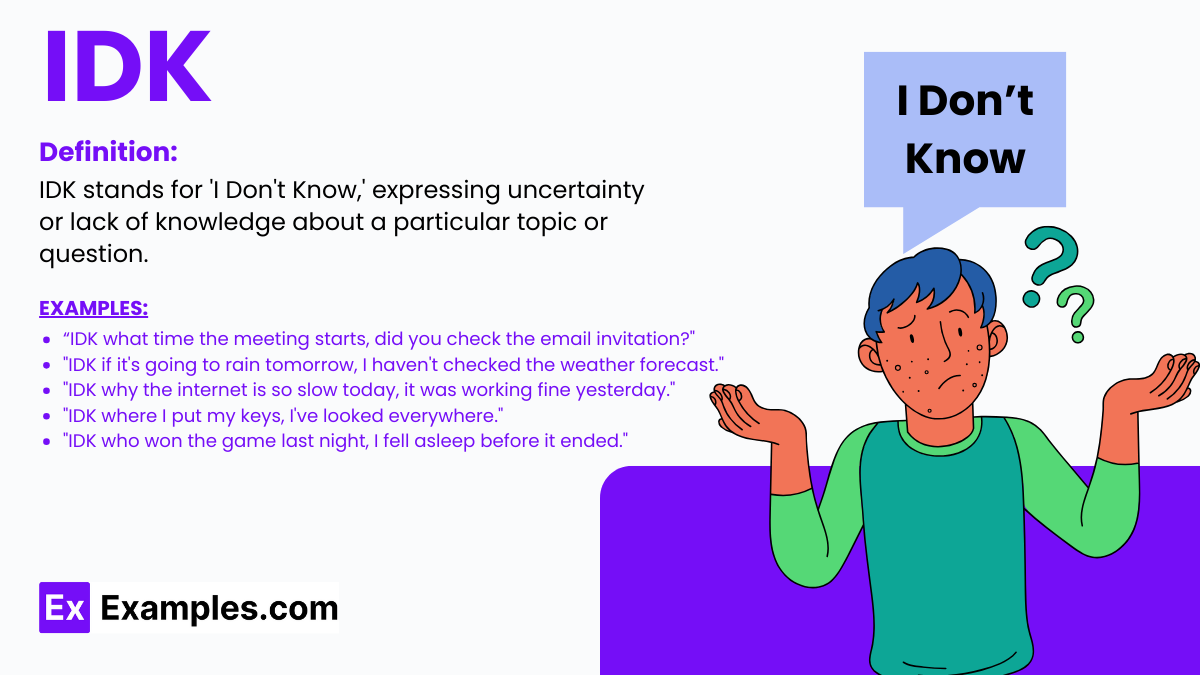IDK – 25+ Examples, Meaning, Differences, How to Use
IDK, short for “I don’t know,” is a common abbreviation used in informal communication, especially in digital messaging and social media. It expresses uncertainty or a lack of information about a topic. The term is widely recognized for its convenience and has become a staple in text-based interactions among people of all ages, helping to convey a casual or non-committal stance efficiently in conversations.
What Does IDK Mean?
IDK stands for “I don’t know.” It’s used predominantly in texting and online communication to express uncertainty or admit a lack of knowledge about a particular subject. This abbreviation is part of informal language and helps convey messages quickly and effectively, especially among younger demographics.
How to Use IDK?
IDK, which stands for “I don’t know,” is a commonly used abbreviation in texting and online communication. Here’s how to use it effectively:
- Casual Conversations:
- Use IDK in informal chats with friends or on social media to convey uncertainty or ignorance about a specific topic. It’s a quick way to express that you don’t have the answer.
- Quick Responses:
- When you need to answer quickly and don’t have time to elaborate or when the information is unknown, IDK is a convenient response. It’s brief and to the point.
- Avoid Formal Use:
- IDK should be avoided in formal or professional communications, such as emails to your boss or during presentations. In these context, it’s better to use complete sentences to convey your message more clearly and professionally.
- Pairing with Other Abbreviations:
- IDK can be combined with other abbreviations like LOL (laugh out loud), BRB (be right back), or TTYL (talk to you later) to keep the conversation light and informal.
- Clarifying Uncertainty:
- You can use IDK when you are unsure about the details or need more time to find out the correct information. It can be a placeholder until you get the right details.
When to Use IDK?
IDK stands for “I don’t know” and is commonly used in texting and casual online communications. Here are the appropriate times to use this abbreviation:
- Informal Texting:
- With Friends and Family: It’s perfect for casual conversations where informal language is acceptable.
- In Social Media Comments: Use IDK to respond quickly to questions or comments when you’re unsure of the answer.
- Instant Messaging:
- Group Chats: When you’re part of a group chat and don’t have input on a specific topic, IDK is a quick way to acknowledge the conversation without giving a detailed response.
- Direct Messages: If someone asks you a question and you need time to find the answer, IDK can be used to indicate that you currently do not know but may find out later.
- Online Forums and Communities:
- When Lacking Expertise: In discussions where you’re asked about topics outside your knowledge area, IDK is a humble admission of not knowing.
- Maintaining Engagement: Keeps the thread active by showing your participation even when you don’t have specific contributions.
- Avoiding Misinformation:
- When Unsure: Instead of potentially providing incorrect information, using IDK ensures that you don’t mislead anyone with guesses or assumptions.
- Situations to Avoid:
- Professional Emails and Communications: It’s not suitable for formal interactions where more thoughtful and composed responses are expected.
- Job Interviews or Official Meetings: In settings that require professionalism and detailed knowledge, avoid using IDK and opt for more complete answers.
IDK vs. IDC

| Aspect | IDK (I Don’t Know) | IDC (I Don’t Care) |
|---|---|---|
| Meaning | Expresses uncertainty or a lack of information about a specific question or topic. | Indicates indifference or a lack of interest regarding a specific question or topic. |
| Usage Context | Used when the speaker does not have the information needed to answer. | Used when the speaker is uninterested in the topic or outcome. |
| Tone | Generally neutral, conveying that information is simply not known. | Can be perceived as dismissive or indifferent, suggesting emotional detachment. |
| Implication | Implies a gap in knowledge that might be filled with further information or research. | Suggests that the speaker does not wish to engage with the topic, regardless of facts. |
| Communication | Often seen as a request for patience or understanding while the information is sought. | May shut down further discussion on the topic due to a clear lack of interest. |
| Appropriate Use | Suitable in any informal setting where admitting lack of knowledge is acceptable. | Best used in informal settings where expressing disinterest does not cause offense. |
What Does IDK Mean in Chat?
In chat, IDK stands for “I don’t know.” It’s a widely used abbreviation in digital communication, especially in text messaging and online chats, to quickly express uncertainty or admit that the sender does not have information regarding a particular question or topic. IDK is helpful for keeping conversations informal and efficient, allowing users to convey a lack of knowledge without needing to provide a detailed response. This abbreviation is particularly useful in fast-paced digital interactions where brevity is appreciated.
Examples of IDK Usage in Chat:
- Uncertainty About Plans:
- Friend 1: “Are we still on for dinner tonight?”
- Friend 2: “IDK, I need to check if I finish work on time.”
- Lack of Opinion on a Topic:
- Person 1: “What do you think about the new restaurant that opened?”
- Person 2: “IDK, I haven’t been there yet.”
- When Asked for Specific Information:
- Classmate: “Do you know what chapters we need to read for the test?”
- You: “IDK, let me ask the teacher and I’ll text you back.”
- Response to a Complex Question:
- Colleague: “Can you explain how the new software integration works?”
- You: “IDK all the details yet, I’m still learning about it myself.”
- In Response to Gossip or Rumors:
- Friend 1: “Did you hear why John didn’t come to the meeting?”
- Friend 2: “IDK, he didn’t mention anything to me.”
What Does IDK Mean in Texting?
In texting, IDK stands for “I don’t know.” It’s a common abbreviation used to quickly communicate that the sender does not have the information requested or is unsure about something. IDK is particularly useful in informal digital conversations, such as SMS or chat apps, where brevity and speed are often valued. This abbreviation helps streamline conversations by conveying a lack of knowledge without the need for lengthy explanations. It’s widely recognized and used across various age groups and contexts in everyday digital communications.
Examples of IDK Usage inTexting:
- Making Plans:
- Person 1: “What time should we meet for the movie?”
- Person 2: “IDK, what time does it start?”
- Discussing Homework:
- Student 1: “Do you remember which pages we were supposed to read for history class?”
- Student 2: “IDK, I forgot to write it down.”
- Talking About Current Events:
- Friend 1: “Who won the game last night?”
- Friend 2: “IDK, I fell asleep before it ended.”
- When Asked for Opinions:
- Sibling 1: “Should I wear this dress to the party?”
- Sibling 2: “IDK, it’s nice, but isn’t it too formal?”
- Regarding Technical Issues:
- Colleague 1: “Why isn’t the report loading on my computer?”
- Colleague 2: “IDK, maybe there’s an issue with the network?”
Examples of IDK in Medical
In medical contexts, IDK stands for “I don’t know,” but it should be used cautiously due to the professional nature of healthcare communication. Here are five examples where a medical professional might use IDK informally, typically in internal communications or less formal discussions, not with patients:
Among Colleagues:
- Nurse 1: “Do you know if Dr. Smith has finished the rounds for ward B?”
- Nurse 2: “IDK, I haven’t seen her schedule today.”
2. Discussing Patient Care:
- Resident: “When is the patient in room 204 scheduled for their MRI?”
- Attending Physician: “IDK, let’s check the system and confirm with radiology.”
3. In Training or Educational Settings:
- Medical Student: “What’s the typical progression for this type of infection?”
- Instructor: “IDK off the top of my head, let’s look up the latest treatment guidelines.”
4. During Research Meetings:
- Researcher 1: “Has the recent study on this drug been published yet?”
- Researcher 2: “IDK, I need to check the latest journals.”
5. Informal Staff Communications:
- Pharmacist: “Do we have enough stock of the flu vaccine for the upcoming clinic?”
- Technician: “IDK, I’ll check the inventory and update you.”
6. In Hospital Operations:
- Administrator: “Do you know when the maintenance team is scheduled to fix the elevator?”
- Front Desk Staff: “IDK, I’ll check the maintenance log and find out.”
7. Regarding Equipment:
- Surgeon: “Is the surgical robot available for my procedure at 2 PM?”
- Operating Room Coordinator: “IDK, let me verify its availability with the equipment manager.”
8. Handling Patient Queries:
- Receptionist: “Can I schedule an appointment with Dr. Johnson for next week?”
- Patient Care Coordinator: “IDK, let me check Dr. Johnson’s schedule and get back to you.”
9. In Quality Control:
- Quality Assurance Manager: “Have we received the latest lab results for the samples we sent?”
- Lab Technician: “IDK, I’ll check the system and see if they’ve been processed.”
10. In Staffing Discussions:
- Department Head: “Do you know if we have enough nurses scheduled for the night shift?”
- Staffing Coordinator: “IDK, I’ll review the staffing schedule and ensure we have adequate coverage.”
Examples of IDK in Sentences
- “IDK what time the meeting starts, did you check the email invitation?”
- “IDK if it’s going to rain tomorrow, I haven’t checked the weather forecast.”
- “IDK why the internet is so slow today, it was working fine yesterday.”
- “IDK where I put my keys, I’ve looked everywhere.”
- “IDK who won the game last night, I fell asleep before it ended.”
- “IDK when the new restaurant is opening, have they announced the date yet?”
- “IDK which movie to watch tonight, there are so many good options.”
- “IDK how to solve this math problem, can you help me figure it out?”
- “IDK if I can make it to the party on Saturday, I’ll have to check my schedule.”
- “IDK if I’m ready for the exam next week, I still need to study more.”
What Does IDK Mean from a Girl?
When a girl says “IDK,” it typically means “I Don’t Know.” It indicates uncertainty or lack of knowledge about a particular topic or question. It’s a common response when someone is unsure about something and needs more information or time to think.
How old is the Word IDK?
The acronym “IDK” (I Don’t Know) emerged in the early days of internet messaging and texting, becoming popular in the late 1990s and early 2000s with the rise of online communication platforms like instant messaging and chat rooms. It’s been in common use for over two decades.
How to Identify if your child is using the IDK slang Word?
To identify if your child is using the “IDK” (I Don’t Know) slang word, observe their online conversations, text messages, or hear their verbal responses. Look for instances where they use “IDK” to indicate uncertainty or lack of knowledge in informal communication.



